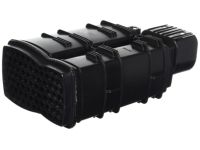×
- Live Chat
- 1-888-984-2011

My Garage
My Account
Cart
Genuine Honda Odyssey Vapor Canister
Fuel Vapor Canister- Select Vehicle by Model
- Select Vehicle by VIN
Select Vehicle by Model
orMake
Model
Year
Select Vehicle by VIN
For the most accurate results, select vehicle by your VIN (Vehicle Identification Number).
7 Vapor Canisters found
Honda Odyssey Canister Assembly
Part Number: 17011-SHJ-A01$200.71 MSRP: $285.92You Save: $85.21 (30%)
Honda Odyssey Vapor Canister
The Vapor Canister installed in the Honda Odyssey vehicles is a critical component of the evaporative emissions control (EVAP) system whose main function is to avoid the escape of hydrocarbons in the atmosphere. This is most commonly known as the carbon or charcoal canister, its role is to store individual fuel vapors and then to inject them into the engine when required under the combustion process. In the course of its production, Honda Odyssey models have incorporated different types of Vapor Canisters that may come with the options of filters which may be replaced and improved working parts that can help identify leaks. The main function remains consistent: In order to deal with the fuel vapors efficiently a certain set of principles had to be implemented. Modern versions are further fitted with enhanced sensors and solenoids to check on the condition and efficiency of the system and, more importantly, to meet the standards with emission standards.
In search of affordable OEM Honda Odyssey Vapor Canister? Consider browsing through our extensive inventory of genuine Honda Odyssey Vapor Canister. Not only do we provide market-leading prices and a manufacturer's warranty, but we also pride ourselves on exceptional customer service and swift delivery.
Honda Odyssey Vapor Canister Parts Questions & Experts Answers
- Q: What is the purpose and function of the Evaporative Emissions Control (EVAP) system,Canister Purge Valve, Fuel Pressure Sensor and Vapor Canister on Honda Odyssey?A: The Evaporative Emissions Control (EVAP) system is developed in order to avoid fuel system vapors which contain hydrocarbons which have not been burned from ever escaping into the atmosphere. On warm days, vapors at fuel tank raise pressure, and are sent through the fuel vapor vent valve and fuel vapor control valve into EVAP canister for several days until the car is next used. During certain conditions only the canister purge valve opens and lets the vapors be drawn into the intake manifold which comes together with the new air and is then burning the vapors in the combustion chambers. The EVAP canister is installed below the automobile in front of the fuel tank and also is made from activated carbon; it is also non serviceable. These are the canister filter, canister vent shut valve, two-way valve, by-pass solenoid valve and the fuel tank pressure sensor. The canister filter ensure that the dirty air is not gets into the system, and the canister vent shut valve ensures that new air gets into the canister during a purging exercise. The fuel tank pressure sensor checks on the pressure and transmits it to the PCM, the PCM also controls the two-way valve with a view of checking on the flow of the vapor and not allow excess vacuum. The use of the bypass solenoid valve is during leak checks to regulate the air supply to the system. Some of the signs of a faulty EVAP are fuel smell, rough idle, and cold drive, that are resulting from malfunctioning valves or broken hoses. The most effective way to identify when fuel vapour pressure is high is by removing the gas cap in a bid to listen for pressure reducing sounds. Replacement of individual components requires the removal of electrical connectors and vacuum connections, dismantling of the mounting bolts and making certain that the new components come with new O-rings.
Related Honda Odyssey Parts
Browse by Year
2024 Vapor Canister 2023 Vapor Canister 2022 Vapor Canister 2021 Vapor Canister 2020 Vapor Canister 2019 Vapor Canister 2018 Vapor Canister 2017 Vapor Canister 2016 Vapor Canister 2015 Vapor Canister 2014 Vapor Canister 2013 Vapor Canister 2012 Vapor Canister 2011 Vapor Canister 2010 Vapor Canister 2009 Vapor Canister 2008 Vapor Canister 2007 Vapor Canister 2006 Vapor Canister 2005 Vapor Canister 2004 Vapor Canister 2003 Vapor Canister 2002 Vapor Canister 2001 Vapor Canister 2000 Vapor Canister 1999 Vapor Canister 1998 Vapor Canister 1997 Vapor Canister 1996 Vapor Canister 1995 Vapor Canister
















